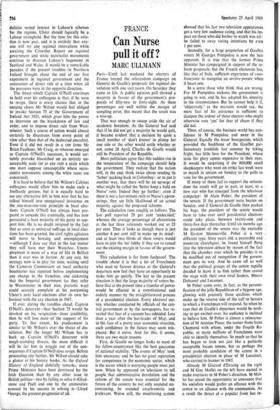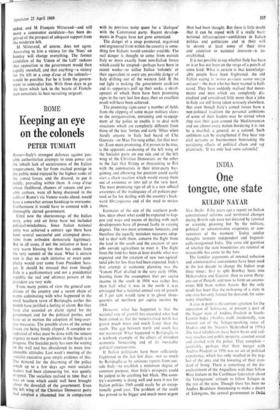Can Nurse pull it off?
FRANCE MARC ULLMANN
Paris—Until last weekend the electors of France treated the referendum campaign on General de Gaulle's proposals for regional de- volution with one vast yawn. On Saturday they came to life. A public opinion poll showed a majority in favour of the government's pro- posals of fifty-two to forty-eight. As these percentages are well within the margin of sampling error, this meant that the result was a toss-up.
That was enough to sweep aside the air of academic boredom. As the General had said that if he did not get a majority he would quit, it became evident that a decision by quite a small number of 'don't knows' to plump for one side or the other would settle whether or not, come 28 April, Charles de Gaulle would still be President of the Republic.
Most politicians agree that this sudden rise in the temperature of the campaign should help the government. They reckon that the nation will, in the end, think twice about sending its `father' packing back to Colombey : or to put it another way, that there will be an upsurge of what might be called the 'better keep a hold on Nurse' vote. Indeed they go further: even if there is not a last-minute rush to Nurse's apron- strings, they see little likelihood of an actual majority against the proposed reforms.
The calculation runs roughly as follows. The last poll reported 29 per cent 'undecided,' whereas the average percentage of abstentions at the last three referenda worked out at 23 per cent. Thus it looks as though there is just another 6 per cent still to make up its mind: and at least two thirds of these voters would have to join the `no' lobby if they are to cancel out the existing margin in favour of the govern- ment.
This calculation is far from foolproof. The trouble about it is that a lot of Frenchmen who used to foresee dramas at the General's departure now feel they have an opportunity to make him go quietly. The key to the present situation is that the large majority of voters be- lieve that at the present time a transfer of power would be effected in a constitutional and orderly manner by the straightforward process of a presidential election. Every electoral sur- vey, whether conducted by officials of the cen- tral government or by the newspapers, has re- vealed that fear of a vacuum has subsided. Less than a year after the barricades of May, and in the face of a pretty sour economic situation, such confidence in the future may seem mis- placed. But it exists. And for this, it seems, there are two main reasons.
First, de Gaulle no longer looks to most of his fellow-countrymen like the best guarantee of national stability. 'The events of May' took him unawares; and he has no great reputation for competence in the economic sector, which is the sector which is worrying people most just now. When he appeared on television to tell people that administrative devolution and the reform of the senate were essential for the future of the country he not only sounded un- convincing, he sounded anachronistic and irrelevant. Worse still, the ;monitoring system showed that his last two television appearances got a very low audience rating, and that his im- pact on those who did bother to watch was nil: he failed to sway voting intentions by even 1 per cent.
Secondly, for a large proportion of Gaullist voters M Georges Pompidou- is now the heir apparent. It is true that the former Prime Minister has campaigned in support of the re- form proposals; but the French electorate has, like that of Italy, sufficient experience of corn- binazione to recognise an arriere-pensie when it hears one.
In a sense those who think thus are wrong. For M Pompidou reckons the government is going to win, and he has adapted his sincerity to the circumstances. But he cannot help it if, `objectively,' as the marxists would say, the mere fact of his existence is sufficient to dampen the ardour of those electors who might otherwise vote 'yes' for fear of chaos if they did not.
Then, of course, the business world has con- fidence in M Pompidou and none in the General. Equally the lesser bourgeoisie, which provided the backbone of the Gaullist par- liamentary landslide last summer by taking fright, has little love for the President, whose taste for glory cqmes expensive in their eyes. It would be surprising if the 800,000 small shopkeepers who went on strike last week were to march in unison on Sunday to the polls to vote for the government.
If many of them fail to support the referen- dum the credit will go in part, at least, to a new star who has emerged from the television campaign: M Alain Poher, the president of _ the senate. If the government were beaten on -4 Sunday, and if General de Gaulle then packed r his bags, the president of the senate would , have to take over until presidential elections could take place, between twenty-one and thirty-five days thereafter. Until six months ago the president of the senate was the excitable M Gaston Monnerville. Poher is a very different type. Sixty years old, a peaceable and, moderate churchgoer, he found himself flung into the television debate by reason of the fact that the chamber over which he presides is to be modified out of recognition if the govern- ment gets its way. And he came off so well that the political groups of the centre rapidly decided to leave it to him rather than crowd the stage with their own iival leaders, Messrs Duhamel and Lecanuet.
M Poher came over, in fact, as the personi- fication of the jolly Republican of a bygone age, glowing with precisely those qualities which make up the reverse side of the call to heroics to which a Frenchman will respond. So when he says that de Gaulle's departure would be noth- ing to get excited over, his audience is inclined to believe him. M Poher is almost a reincarna- tion of M Antoine Pinay, the tanner from Saint Chamond with whom, under the Fourth Re- public, so many millions of Frenchmen were able to identify themselves. So much so that he has begun to look not just like a perfectly acceptable locum tenens, but as perhaps the most probable candidate of the centre in a presidential election in place of M Lecanuet, who carried its banner in 1965.
Already M Giscard d'Estaing on the right and M Guy Mollet on the left have started to make overtures in M Poher's direction. M Mol- let has seized the opportunity to announce that his socialists would prefer an alliance with the centre to an alliance with the communists. As a result the threat of a popular front has re- ceded, and M Francois Mitterand—and still more a communist candidate—has been de- prived of the prospect of adequate support from the moderate left.
M Mitterand, of course, does not agree. According to him a victory for the 'Noes' on Sunday will change everything. The former candidate of the 'Union of the Left' reckons that opposition to the government would then rapidly snowball, and that anything—a victory for the left or a coup d'etat of the colonels— would be possible. Far be it from the govern- ment to contradict him. With three days to go the fears which lurk in the hearts of French- men constitute its best recruiting sergeant.











































 Previous page
Previous page